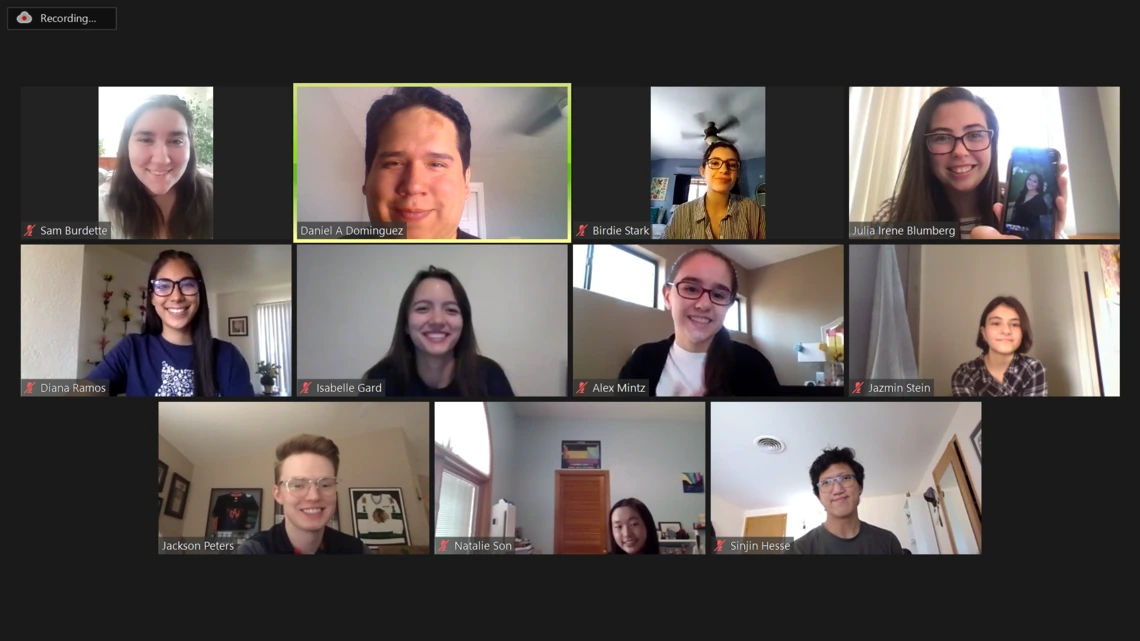High school workshop returns virtually for 2021 with "highly motivated" group learning reporting skills

A group photo via Zoom. (From top left) Sam Burdette, Andrés Domínguez, Birdie Stark, Julia Blumberg (holding a photo of Esme Canelos) (Middle from left) Diana Ramos, Isabelle Gard, Alex Mintz, Jazmin Stein (Bottom from left) Jackson Peters, Natalie Son, John Hesse.
After the pandemic canceled the 2020 Donald W. Carson Journalism Diversity Workshop for Arizona High School Students, the program returned this year with a “highly motivated” group eager to learn about reporting, writing, photography, video and podcasting.
The program, sponsored by the Dow Jones News Fund, has been offered at the University of Arizona School of Journalism since 1981. The 2021 workshop was held virtually from May 30 to June 5 with a health and wellness theme.
Founded by Carson, the workshop was renamed in his honor after he died in 2018 at 85. Carson, a revered UA journalism professor from 1966 to 1997 and former department head, was one of the early leaders in helping diversify the nation’s newsrooms.
The school welcomed high school students Esme Canelos (University High), Shundine Fowler (Page High), Isabelle Gard (Empire High), John Hesse (University High), Alexandra Mintz (Tri-City College Prep), Aaliyah Orozco (Douglas High), Birdie Stark (University High), Jazmin Stein (Douglas High) and Natalie Son (University High).
“To say I was impressed would be an understatement,” said Julia Blumberg, a master’s student and workshop co-director. “All the students were highly motivated and eager to learn. Some had previous journalism experience, and for some this was completely new.”
ProPublica reporter Nicole Santa Cruz, a 2009 J-school graduate, welcomed the group and led a discussion on community reporting and empathy toward interviewees. John de Dios (’05) and Alan Davis (’15) followed with a talk about photojournalism.
The next day Professor Jeannine Relly (’91, M.A.) spoke with the students about the basics of sourcing and reporting.
Arizona Public Media’s Cáit NíSíomón discussed mental health reporting during the Covid-19 pandemic. Later, de Dios and Davis explained multimedia reporting. Professor Carol Schwalbe and Blumberg worked together to present podcasting and interviewing.
Report for America corps member Jasmine Demers (’19, M.A.) described government reporting during the pandemic, while the Arizona Daily Star’s Danyelle Khmara (’17) tackled education reporting.
Professor Jessica Retis met with students about bilingual reporting. Brandi Espuma, University of Arizona admissions counselor, and J-school academic adviser Paloma Boykin (’08) held a virtual roundtable about the admissions process and finding a major.
“The workshop was a really valuable experience,” said Gard, a senior at Empire High in Vail. “Not only was I able to gain insight into what journalism is like as a career, but I was able to listen to awesome speakers and gain skills that will be useful even outside of journalism.”
Students wrote stories and took photos for The Chronicle website. Birdie Stark created a podcast on food insecurity. Other topics included screen addiction during the pandemic, sexual misinformation, different points of view for hybrid and online learning, teenage substance abuse during the pandemic, lupus and the challenges of working out during the stay-at-home order.
“It can be hard to find people to interview, but most (students) did well in finding people, and if they were unable, we helped connect them to what we know would be a good person for them to interview,” Blumberg said. “I think conducting this workshop on Zoom also allowed for ease in finding more willing participants, as interviews could be conducted virtually and people may be more willing to participate.”
Gard, who wrote about sexual misinformation, said she wasn’t sure how a “mature” topic might be received because of her age.
“I decided that I wanted to use the (workshop) to learn more about a topic that I did not know as much about, as well as test the waters with taboo topics,” said Gard, who plans on applying to the university. “I was still a little worried since I’m a minor, so on the first day when we were brainstorming, the first thing I asked was, ‘Can we write about mature topics?’ And what (co-director) Andrés Domínguez responded with was, ‘Think about it this way: If you don’t cover this story, who will?’ Advice from Andrés and the mentors helped me to be more confident about pursuing the story.”
Although the 2021 workshop was different from previous years, when students lived in dorms on campus and had more hands-on experience with photography, audio and video, Blumberg felt the students did an exemplary job.
“After having a full Zoom year of learning or hybrid learning, these students pushed forward and were motivated to produce these stories without a break between school and this workshop,” Blumberg said. “That shows their perseverance, and I was lucky to work with and learn from them.”
Blumberg was co-director with Andrés Domínguez (’13), administrative assistant for the School of Journalism. In addition to Blumberg, J-school mentors Sam Burdette (’20), Jackson Peters (’20) and Diana Ramos, the school’s junior of the year, worked with students on their stories.
The 2022 workshop is tentatively scheduled for June 5-11.

